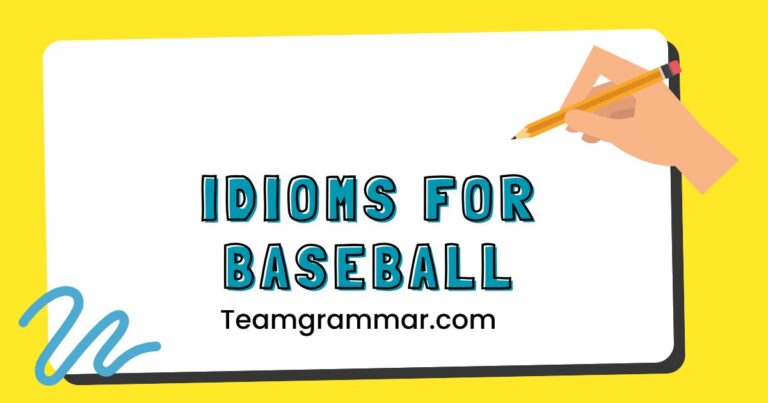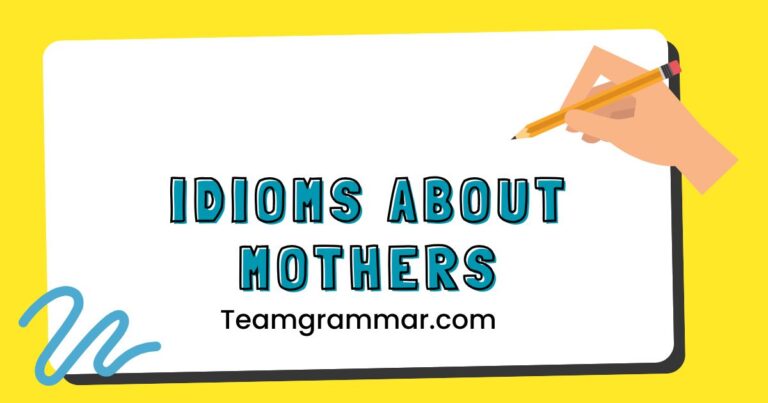41 Idioms for Old Age: Mastering Figurative Language in English
Understanding idioms related to old age is crucial for comprehending nuanced English conversations and literature. These idioms often convey cultural attitudes and perceptions about aging, adding depth and color to communication.
This article provides a comprehensive guide to common idioms associated with old age, exploring their meanings, origins, and usage. It’s perfect for ESL learners, writers, and anyone interested in expanding their knowledge of English figurative language and cultural expressions.
Table of Contents
- Introduction
- Definition of Idioms for Old Age
- Structural Breakdown of Idioms
- Types and Categories of Idioms for Old Age
- Examples of Idioms for Old Age
- General Age-Related Idioms
- Physical Decline Idioms
- Wisdom and Experience Idioms
- Outdated and Irrelevant Idioms
- Life Stage Idioms
- Usage Rules for Idioms
- Common Mistakes with Idioms
- Practice Exercises
- Advanced Topics in Idiom Usage
- FAQ: Frequently Asked Questions
- Conclusion
Introduction
Idioms are an integral part of the English language, adding color, depth, and cultural context to communication. When discussing old age, a variety of idioms come into play, each carrying its own unique connotation and historical baggage.
Understanding these idioms is essential for anyone seeking to master the nuances of English. This article will delve into the world of idioms related to old age, examining their meanings, origins, and proper usage, offering learners a comprehensive guide to incorporating them effectively into their own language.
This guide will benefit ESL learners by expanding their vocabulary and comprehension skills. It will assist writers in crafting more vivid and authentic dialogue.
Furthermore, anyone interested in linguistic analysis or cultural studies will find value in understanding how these idioms reflect societal attitudes towards aging. Through examples, exercises, and detailed explanations, this article aims to demystify the world of age-related idioms and empower readers to use them with confidence.
Definition of Idioms for Old Age
An idiom is a phrase or expression whose meaning cannot be understood from the literal meanings of its individual words. Instead, an idiom’s meaning is figurative and culturally specific.
Idioms related to old age describe the various aspects of aging, including physical decline, wisdom, experience, and societal perceptions. These idioms offer a concise and often colorful way to express complex ideas about growing older.
Idioms related to old age can be classified based on their function. Some describe the physical changes associated with aging, such as “over the hill” or “doddering.” Others focus on the wisdom and experience gained over a lifetime, like “old head on young shoulders.” Still others capture the feeling of being outdated or irrelevant, such as “a thing of the past.” The context in which these idioms are used is crucial for proper interpretation.
Structural Breakdown of Idioms
Idioms, by their nature, defy standard grammatical analysis. They are fixed expressions, meaning their structure cannot be altered without losing their idiomatic meaning.
The structural elements of an idiom often bear little resemblance to the literal meaning of the phrase. For example, in the idiom “long in the tooth,” the words “long,” “in,” and “tooth” individually have literal meanings, but combined, they describe someone who is old.
The patterns in idioms are primarily lexical, meaning they depend on the specific words used and their arrangement. While some idioms may share similar structural patterns, they are generally learned and understood as individual units.
There are no strict grammatical rules governing the formation of idioms; their structure is determined by historical usage and cultural convention. Therefore, the best way to understand the structure of idioms is to study and memorize them in context.
Types and Categories of Idioms for Old Age
Idioms related to old age can be categorized based on the aspect of aging they describe. Here are several categories:
General Age-Related Idioms
These idioms broadly refer to the process of aging without focusing on specific aspects.
Physical Decline Idioms
These idioms describe the deterioration of physical health and abilities associated with aging.
Wisdom and Experience Idioms
These idioms highlight the knowledge and insight gained through years of experience.
Outdated and Irrelevant Idioms
These idioms describe the feeling of being outdated or no longer relevant in a changing world.
Life Stage Idioms
These idioms refer to specific stages or milestones in the later part of life.
Examples of Idioms for Old Age
The following tables provide examples of idioms related to old age, categorized by the types described above. Each example is accompanied by its meaning and a sample sentence to illustrate its usage.
General Age-Related Idioms
This table provides examples of general age-related idioms, explaining their meaning and providing example sentences.
| Idiom | Meaning | Example Sentence |
|---|---|---|
| Over the hill | Past one’s prime; too old to be effective | He realized he was over the hill when he couldn’t keep up with the younger players. |
| Long in the tooth | Old; elderly | She’s getting a bit long in the tooth to be running marathons. |
| Getting on in years | Becoming old | My grandfather is getting on in years, but he’s still very active. |
| No spring chicken | Not young anymore | I’m no spring chicken, but I can still handle this job. |
| Advanced in years | Old; elderly | The professor, advanced in years, still lectured with passion. |
| Of a certain age | Middle-aged or older | She was a woman of a certain age, with a wealth of experience. |
| Past it | Too old to do something | He’s past it when it comes to competitive sports. |
| In one’s golden years | The later years of life, typically after retirement | They are enjoying their golden years traveling the world. |
| On the wrong side of [age] | Older than a specified age | He’s on the wrong side of fifty, but he still looks great. |
| One foot in the grave | Very old and near death | He’s got one foot in the grave, but he’s still full of life. |
| Life begins at [age] | A saying that life can be fulfilling at any age, often used for older ages. | She believes life begins at sixty and is starting a new career. |
| Ripe old age | A very old age, often implying a long and fulfilling life. | She lived to a ripe old age, surrounded by family and friends. |
| The autumn of one’s life | The later years of life, often associated with reflection and wisdom. | In the autumn of his life, he wrote a memoir about his experiences. |
| Senior citizen | An older person, typically retired and over a certain age. | Senior citizens often receive discounts at movie theaters. |
| Getting on a bit | Becoming slightly old. | He’s getting on a bit, but he still enjoys his daily walks. |
| Old timer | An elderly person, especially one with a long history or experience. | The old timer told stories of the town’s early days. |
| Second childhood | A state of declining mental or physical health in old age, resembling childhood. | Some say that old age is like a second childhood. |
| Vintage | Of high quality and lasting value, often used to describe older people with grace and style. | She’s a vintage actress, admired for her talent and elegance. |
| Around the block a few times | Experienced and knowledgeable. | He’s been around the block a few times and knows how to handle these situations. |
| Not as young as one used to be | A polite way of saying someone is getting old. | I’m not as young as I used to be, but I still enjoy playing golf. |
| Old as the hills | Extremely old. | That joke is as old as the hills. |
| The wrong side of the hill | Past one’s prime; getting old. | He felt like he was on the wrong side of the hill after his 50th birthday. |
| Over the hill and far away | Past one’s prime; no longer useful or effective. | Some people might think I’m over the hill and far away, but I still have a lot to offer. |
Physical Decline Idioms
This table provides examples of idioms describing physical decline, explaining their meaning and providing example sentences.
| Idiom | Meaning | Example Sentence |
|---|---|---|
| Doddering | Weak and unsteady on one’s feet, typically due to old age | The doddering old man struggled to cross the street. |
| Failing health | Declining physical condition due to age or illness | Her failing health made it difficult for her to travel. |
| Not what it used to be | No longer in good condition or health | His eyesight is not what it used to be. |
| Slowing down | Becoming less active or energetic due to age | She’s slowing down a bit, but she still enjoys her hobbies. |
| Feeling one’s age | Experiencing the physical effects of aging | I’m really feeling my age today after all that gardening. |
| Worn out | Exhausted and weakened by age or use | His worn-out body couldn’t handle the strain anymore. |
| Past one’s best | No longer in the best physical condition | The car is past its best, but it still runs. |
| On its last legs | Near the end of its life or usefulness | The old chair is on its last legs. |
| Going downhill | Gradually declining in health or condition | After the accident, his health started going downhill. |
| Losing steam | Becoming less energetic or enthusiastic | He started losing steam towards the end of the project. |
| A shadow of one’s former self | Significantly weaker or less capable than in the past. | After the illness, he was a shadow of his former self. |
| Run-down | In poor condition due to age or overuse. | The old house looked run-down and neglected. |
| Creaking joints | Stiff and painful joints, often associated with old age. | He could hear his creaking joints as he climbed the stairs. |
| Aches and pains | Common discomforts associated with aging. | She woke up with the usual aches and pains of old age. |
| Silver threads among the gold | Gray hair mixed with other colors, symbolizing aging. | He noticed silver threads among the gold in her hair. |
| Thinning on top | Losing hair, especially on the head, due to age. | He was thinning on top, but he didn’t mind. |
| Slightly deaf | Having some difficulty hearing, common in older people. | She was slightly deaf and had to turn up the volume. |
| Eyesight failing | Experiencing a decline in vision due to age. | His eyesight was failing, so he needed stronger glasses. |
| A bit wobbly | Unstable or unsteady on one’s feet. | She was a bit wobbly after sitting for so long. |
| Slow of foot | Moving slowly due to age or infirmity. | He was slow of foot, but he still enjoyed walking. |
| Hard of hearing | Having difficulty hearing. | He’s getting hard of hearing and needs to use a hearing aid. |
| Bent over | Stooped or hunched over, often due to age. | He was bent over with age and walked with a cane. |
| Feeble | Weak and frail. | The old man was feeble and needed assistance. |
Wisdom and Experience Idioms
This table provides examples of idioms emphasizing wisdom and experience, explaining their meaning and providing example sentences.
| Idiom | Meaning | Example Sentence |
|---|---|---|
| Old head on young shoulders | A young person who thinks and acts like an older, wiser person | She’s only 18, but she has an old head on young shoulders. |
| Seen it all before | Experienced many things and not easily surprised | He’s seen it all before and knows how to handle any situation. |
| Been there, done that | Experienced something and moved on | I’ve been there, done that, and I’m not going back. |
| Learned the hard way | Gained knowledge through difficult experiences | He learned the hard way that honesty is the best policy. |
| Seasoned veteran | Someone with a lot of experience in a particular field | She’s a seasoned veteran in the world of journalism. |
| Wise owl | Someone who is very wise and knowledgeable | He’s a wise owl and always gives good advice. |
| Lived and learned | Gained wisdom through life experiences | I’ve lived and learned, and now I know better. |
| Knowing the ropes | Understanding how things work in a particular situation | He knows the ropes and can guide you through the process. |
| A wealth of experience | A large amount of knowledge and skill gained over time | She has a wealth of experience in the field of education. |
| Battle-scarred | Having a lot of experience, often from difficult situations | He’s a battle-scarred negotiator who knows how to get results. |
| World-weary | Tired of the world and its problems, often due to long experience. | The world-weary traveler had seen too much suffering. |
| Long years of service | A significant period of time dedicated to a particular job or cause. | He was honored for his long years of service to the community. |
| Years of experience | A significant amount of time spent gaining knowledge and skills. | Her years of experience made her an invaluable asset to the company. |
| Experienced hand | Someone who is skilled and knowledgeable due to experience. | The experienced hand was able to fix the problem quickly. |
| Veteran | Someone with long experience in a particular field. | He’s a veteran journalist with over 30 years in the business. |
| Sage | A wise and experienced person. | The sage offered guidance to those who sought his wisdom. |
| Street smart | Having the knowledge and skills to survive in difficult situations. | He was street smart and knew how to avoid trouble. |
| Book smart | Having knowledge gained from books and formal education. | She was book smart but lacked practical experience. |
| Grizzled | Having gray or partly gray hair, often associated with wisdom. | The grizzled old man shared his stories with the young children. |
| Gray hair is a crown of splendor | A saying that old age and wisdom are honorable. | Gray hair is a crown of splendor if it is attained in the way of righteousness. |
| Old is gold | A saying that old things or people are valuable and precious. | In this family, we believe that old is gold. |
Outdated and Irrelevant Idioms
This table provides examples of idioms suggesting outdatedness, explaining their meaning and providing example sentences.
| Idiom | Meaning | Example Sentence |
|---|---|---|
| A thing of the past | No longer relevant or important | Typewriters are a thing of the past in most offices. |
| Old hat | Outdated or boring | That style of music is old hat these days. |
| Behind the times | Not up-to-date with current trends or technology | My grandfather is a bit behind the times when it comes to computers. |
| Out of touch | Not aware of current events or trends | He’s out of touch with what young people are interested in. |
| Past its sell-by date | No longer fresh or relevant | That idea is past its sell-by date. |
| Yesterday’s news | No longer interesting or important | That scandal is yesterday’s news. |
| A dinosaur | Someone or something that is outdated and no longer relevant | He’s a dinosaur in the tech industry. |
| Set in one’s ways | Unwilling to change one’s habits or opinions | My father is set in his ways and doesn’t like trying new things. |
| Stuck in a rut | Living a boring and repetitive life | He felt like he was stuck in a rut and needed a change. |
| Old-fashioned | Outdated in style or manner | Her clothes are a bit old-fashioned. |
| Behind the curve | Lacking current knowledge or understanding. | He’s behind the curve when it comes to social media. |
| Out of the loop | Not informed about recent developments. | I was out of the loop and didn’t know about the meeting. |
| Past its prime | No longer at its best. | The company is past its prime and needs to innovate. |
| Has-been | Someone who was once famous or successful but is no longer. | He’s a has-been actor trying to make a comeback. |
| Living in the past | Dwelling on past events and not focusing on the present. | She’s living in the past and can’t move on. |
| Outdated mindset | Having beliefs and attitudes that are no longer relevant. | He has an outdated mindset and needs to adapt to the times. |
| A relic of the past | Something that is old and no longer useful. | The old typewriter is a relic of the past. |
| Old school | Traditional or old-fashioned. | He’s an old school teacher who believes in strict discipline. |
| Ancient history | Something that happened a long time ago and is no longer important. | That argument is ancient history. |
Life Stage Idioms
This table provides examples of idioms referring to life stages, explaining their meaning and providing example sentences.
| Idiom | Meaning | Example Sentence |
|---|---|---|
| Golden years | The later years of life, typically after retirement | They are enjoying their golden years traveling the world. |
| Twilight years | The final years of life, often associated with decline | She spent her twilight years in a nursing home. |
| Autumn years | The later years of life, often associated with reflection and wisdom | In the autumn years of his life, he wrote a memoir. |
| The sunset of life | The final stage of life, approaching death. | He was in the sunset of his life, surrounded by loved ones. |
| Third age | The period of life after middle age, often characterized by leisure and personal growth. | The university offers courses for people in their third age. |
| Late in life | Happening or starting in old age. | She found love late in life and remarried. |
| The last chapter | The final stage of life. | He was writing the last chapter of his life. |
| The homestretch | The final part of a journey or endeavor, often used metaphorically for the end of life. | He’s in the homestretch of his life, making the most of every day. |
Usage Rules for Idioms
Using idioms correctly requires understanding their specific meanings and contexts. Idioms cannot be interpreted literally, so it’s essential to learn their figurative meanings.
Furthermore, idioms are often culturally specific, and their usage may vary across different regions or social groups. Pay attention to the context in which an idiom is used to ensure it is appropriate.
While idioms are generally fixed expressions, some idioms allow for slight variations in wording. However, changing the words too much can alter or destroy the idiomatic meaning.
For example, “over the hill” is a common idiom, but saying “above the hill” would not convey the same meaning. It’s best to stick to the standard wording of idioms to avoid confusion.
When using idioms in writing, consider your audience and the tone of your piece. Idioms can add color and personality to your writing, but overuse can make it sound unnatural or forced.
Choose idioms that are appropriate for your audience and the overall message you are trying to convey.
Common Mistakes with Idioms
One of the most common mistakes with idioms is interpreting them literally. Because idioms have figurative meanings, trying to understand them based on the individual words can lead to misinterpretation.
For example, someone unfamiliar with the idiom “long in the tooth” might think it refers to someone with unusually long teeth, rather than someone who is old.
Another common mistake is using the wrong words or grammatical structure in an idiom. Idioms are fixed expressions, and changing the wording can alter or destroy their meaning.
For example, saying “over the mountain” instead of “over the hill” would not convey the same idiomatic meaning.
Finally, using idioms inappropriately in formal writing or speech can make your communication sound unprofessional. Idioms are generally more appropriate in informal settings, such as conversations with friends or creative writing.
In formal contexts, it’s best to use more direct and literal language.
| Incorrect | Correct | Explanation |
|---|---|---|
| He is very long in the mouth. | He is long in the tooth. | “Long in the tooth” is the correct idiom. |
| She is on the wrong side of the mountain. | She is on the wrong side of the hill. | “On the wrong side of the hill” is the correct idiom. |
| They are in their silver years. | They are in their golden years. | “Golden years” is the correct idiom. |
| He is getting on in months. | He is getting on in years. | “Getting on in years” is the correct idiom. |
Practice Exercises
Test your understanding of idioms related to old age with these practice exercises. Choose the correct idiom to complete each sentence.
| Question | Answer |
|---|---|
| 1. He’s not a ____ anymore, but he can still run a mile. (spring chicken, old bird, wise owl) | spring chicken |
| 2. She’s ____ and enjoying her retirement. (over the hill, in her golden years, past her prime) | in her golden years |
| 3. He’s ____ when it comes to new technology. (behind the times, ahead of the curve, on the ball) | behind the times |
| 4. She’s ____ and knows how to handle any situation. (seen it all before, born yesterday, wet behind the ears) | seen it all before |
| 5. He’s ____ and can’t hear very well. (hard of hearing, all ears, on the same wavelength) | hard of hearing |
| 6. After the accident, he was ____. (a shadow of his former self, full of beans, in the pink) | a shadow of his former self |
| 7. She believes that ____ and is starting a new career at 60. (life begins at forty, life begins at sixty, you’re only as old as you feel) | life begins at sixty |
| 8. He’s ____ and doesn’t like trying new things. (set in his ways, going places, full of hot air) | set in his ways |
| 9. The old house is ____ and needs repairs. (on its last legs, in tip-top shape, as good as new) | on its last legs |
| 10. She has ____ in the field of education. (a wealth of experience, a hidden agenda, a chip on her shoulder) | a wealth of experience |
Complete the following sentences using idioms related to old age.
| Question | Answer |
|---|---|
| 1. Even though he’s ____, he still enjoys playing tennis every week. | getting on in years |
| 2. She’s ____ and can always offer wise advice. | an old head on young shoulders |
| 3. That style of music is ____; young people aren’t interested in it anymore. | old hat |
| 4. He’s ____ and needs to adapt to the latest technology. | behind the times |
| 5. She’s ____, so she’s decided to retire and travel the world. | in her golden years |
| 6. He’s ____ after working in the same job for 40 years. | stuck in a rut |
| 7. After the illness, he was ____ and needed constant care. | a shadow of his former self |
| 8. The old car is ____, but it still runs. | past its best |
| 9. She’s ____ and has learned many valuable lessons. | lived and learned |
| 10. He’s ____ and isn’t aware of the latest trends. | out of touch |
Advanced Topics in Idiom Usage
For advanced learners, exploring the etymology and cultural context of idioms can provide a deeper understanding of their meaning and usage. Many idioms have historical roots that shed light on their figurative meanings.
Researching the origins of idioms can also reveal cultural attitudes and beliefs about aging.
Another advanced topic is the use of idioms in literature and creative writing. Skilled writers use idioms to add depth, color, and authenticity to their work.
Analyzing how idioms are used in different literary genres can help you develop your own writing style. Pay attention to how writers use idioms to create character, set the mood, and advance the plot.
Finally, consider the use of idioms in different dialects of English. Idioms can vary significantly across different regions and social groups.
Learning about these variations can help you communicate more effectively with people from different backgrounds. Be aware that some idioms may be offensive or inappropriate in certain contexts.
FAQ: Frequently Asked Questions
- What is the difference between an idiom and a proverb?
An idiom is a phrase whose meaning is not predictable from the usual meanings of its elements, while a proverb is a short, well-known saying that expresses a general truth or piece of advice. Idioms are figurative expressions, while proverbs are statements of wisdom or common sense. For example, “over the hill” is an idiom, while “look before you leap” is a proverb.
- How can I learn more idioms?
The best way to learn idioms is through exposure to the English language. Read books, watch movies, listen to podcasts, and engage in conversations with native speakers. Pay attention to the idioms that are used and try to understand their meanings in context. You can also use online resources and idiom dictionaries to expand your knowledge.
- Are idioms the same in all English-speaking countries?
No, idioms can vary significantly across different English-speaking countries and regions. Some idioms are specific to certain dialects or cultural groups. Be aware of these variations and try to learn the idioms that are commonly used in the areas where you will be communicating.
- Is it okay to use idioms in formal writing?
In general, it’s best to avoid using idioms in formal writing, such as academic papers or business reports. Idioms are more appropriate in informal settings, such as conversations with friends or creative writing. In formal contexts, it’s better to use more direct and literal language.
- How can I avoid misusing idioms?
To avoid misusing idioms, make sure you understand their specific meanings and contexts. Don’t try to interpret idioms literally. Use online resources and idiom dictionaries to verify the meaning and usage of idioms. Practice using idioms in conversation and writing, and ask for feedback from native speakers.
- What should I do if I don’t understand an idiom?
If you don’t understand an idiom, ask someone to explain it to you. You can also look it up in an idiom dictionary or online resource. Pay attention to the context in which the idiom is used to get a better understanding of its meaning.
- Are there any idioms that are offensive or inappropriate?
Yes, some idioms can be offensive or inappropriate, depending on the context and the audience. Be aware of the potential for offense and avoid using idioms that could be considered discriminatory or insensitive. When in doubt, it’s best to use more neutral language.
- How do I know when to use an idiom?
Use idioms when you want to add color, depth, and personality to your communication. Idioms can make your writing and speech more engaging and authentic. However, don’t overuse idioms, as this can make your communication sound unnatural or forced. Choose idioms that are appropriate for your audience and the overall message you are trying to convey
Conclusion
Mastering idioms related to old age is an essential step in achieving fluency and cultural competence in the English language. These idioms offer a unique window into societal attitudes and perceptions about aging, adding depth and nuance to communication.
By understanding the meanings, origins, and usage rules of these idioms, learners can express themselves more effectively and comprehend the subtleties of English conversation and literature.
This article has provided a comprehensive guide to idioms for old age, covering their definition, structure, types, and usage. Through examples, exercises, and FAQs, readers have gained a solid foundation for incorporating these idioms into their own language.
As you continue your journey of learning English, remember to pay attention to the idioms you encounter and practice using them in context. With time and effort, you will become proficient in the art of idiomatic expression and unlock new levels of communication.







